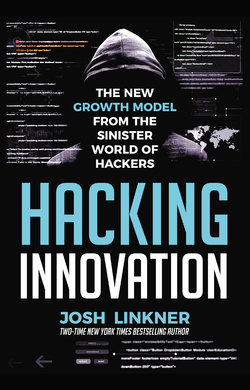Читать книгу Hacking Innovation - Josh Linkner - Страница 7
На сайте Литреса книга снята с продажи.
BE FROGGER
ОглавлениеTraditional innovation approaches are simply out of date. Which is a real problem for you, whether you’re a manager at a giant multinational or run your own small business.
A confluence of forces has formed to create a potent cocktail of change. Friction-free global markets fueled by fully-transparent, real-time information have rendered previous competitive advantages impotent. By 2020, Millennials will represent 50% of the global workforce and a nearly equal portion of consumer buying power. Their expectations, needs, and internal drivers are very different than previous generations, which fuels the need for change in nearly every business. Shifting demographics, increasing speed, exponential complexity, emergent technologies, geo-political turmoil, and even shifting ideologies are creating a business landscape with an unprecedented rate of change.
Growing up in an era when video games hit the mainstream, I was always drawn to the game of Frogger. The player assumes the role of a motivated frog, trying to make his way across a river. Without the ability to swim, he must hop on a variety of things such as logs, turtles, and lily pads as they glide through the river rapids. The challenge is that nothing remains stationary. Each leap onto stable ground is temporary, since all the items are zooming down the river. Even the respite of a dry log is temporary; if the frog tries to stay on stable footing too long, he falls into the river and dies. To win, he must leap quickly from one short-lived success to another. As the game advances, safe harbors become less frequent and faster moving, leaving the poor frog in a constant state of unrest and instability.
Sound familiar?
To a great degree, we are living in a three-dimensional game of Frogger. Competitive wins, top tier financial performance, and brand supremacy are all temporary states, met with an ever-increasing stream of change. Yet the models we use to lead, innovate, and grow have not evolved to meet the challenges of the day. Traditionalist approaches are yielding diminishing returns as the playing field becomes more complex and difficult. While most business leaders succumb to their instincts of doubling down on what worked in the past, those embracing the new model – hacking – will enjoy a disproportionate share of the spoils.
A quick compare-and-contrast:The hacking approach will become your most powerful system to meet expanding obstacles, challenges, and opportunities. The approach is not relegated to tech startups or fringe markets, but can be applied to drive growth in any business setting – from a Fortune 500 biotech company, to the corner dry cleaner, and everywhere in between.
A core tenet of hacking is that it is a meritocratic approach. In other words, hacking doesn’t require a fancy title or limitless resources. Zuckerberg toppled Murdoch by embracing hacking. Fittingly, David defeated Goliath through a hack. Facing a much larger and well-equipped foe, David identified and then exploited a small weakness to bring a seemingly impenetrable opponent to his knees. A traditional approach would be to summon more resources, attack only when enough conventional strength was amassed, and engage in classic combat. Yet David was able to hack his way to victory using an unorthodox approach. Hacking is imminently accessible no matter your age, race, rank, gender, education, background, or political views. Hacking is the great equalizer.
